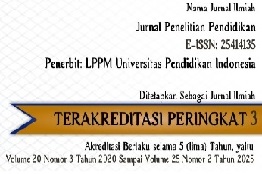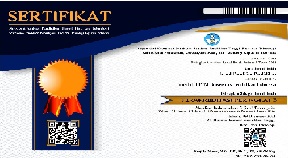Peran Komunikasi Kepemimpinan Pendidikan dalam Membangun Relasi
Abstract
Kepala Sekolah selaku pemimpin di jalur pendidikan formal memerlukan kemampuan dalam membangun relasi yang baik dengan para guru, tenaga kependidikan, orang tua serta siswa. Dari hasil pengamatan lapangan, masih terdapat jurang pemisah antara kepemimpinan kepala sekolah dengan keterbangunan relasi dalam lingkungan kerja. Artikel ini dibuat untuk menggambarkan pentingnya peran kompetensi komunikasi kepala sekolah dalam membangun relasi demi mewujudkan tujuan Rencana Pembangunan Jangka Panjang Nasional berdasarkan studi dokumentasi.
Keywords
Full Text:
PDFReferences
Barker, L. (1991). Listening behavior. New Orleans: Spectra.
Beer, M. (2009). High Commitment, High Performance: How to Build a Resilient Organization for Sustained Advantage. San Fransisco: Jossey-Bass A Wiley Imprint.
Benward, B., & Kolosick, T. J. (1995). Ear training: A technique for listening. Madison, WI: Brown and Benchmark.
Bornman, D.A.J. & Puth, G. (2017). Investigating employee perceptions of leadership communication. Journal of Contemporary Management Vol. 14, pp. 1 – 23.
C.P.M. Verret. (2017). "How do educational leaders in small, fragile, and developing countries translate their understandings of student learning and achievement into leadership practices? A case-study about leadership in Haïtian urban schools". Electronic Thesis and Dissertation Repository. 4867. [Online] downloaded on July 2019, retrieved from https://ir.lib.uwo.ca/etd/4867.
Cunliffe, A. L., & Eriksen, M. (2011). Relational leadership. Human Relations, 64(11), 1425–1449. https://doi.org/10.1177/0018726711418388
Daft & Marcic, 2016
Dues, M. (2003). Boxing Plato’s shadow: The study of human communication. New York: McGraw-Hill.
Gilbert, M.B. (2004). Communicating effectively: Tools for educational leaders. Lanham, MD: Scarecrow Press.
Gill, R. (2011). Theory and Practice of Leadership 2nd Edition. London: SAGE Publications Ltd.
Girma, S. (2016). The relationship between leadership style, job satisfaction and culture of the organization. International Journal of Applied Research Vol. 2(4) pp. 35 – 45.
Johansson, C., D. Miller, V. and Hamrin, S. (2014), "Conceptualizing communicative leadership: A framework for analysing and developing leaders’ communication competence", Corporate Communications: An International Journal, Vol. 19 No. 2, pp. 147-165. https://doi.org/10.1108/CCIJ-02-2013-0007
Johnson, L., et. al. (2003). Absolute honesty: Building a corporate culture that values straight talk and rewards integrity. New York: AMACOM.
Khalifa, M. A., Gooden, M. A., & Davis, J. E. (2016). Culturally Responsive School Leadership: A Synthesis of the Literature. Review of Educational Research, 86(4), 1272–1311. https://doi.org/10.3102/0034654316630383
Kouzes, J.M. & Posner, B.Z. (2003). The Leadership Challenge. San Fransisco: Jossey-Bass.
Lindsey, R.B., Nuri-Robins, K, Terrell, R.D., & Lindsey, D.B. (2019). Cultural Profiency: A Manual for School Leaders 4th Ed. California, USA: Corwin, A SAGE Company.
Lunenburg, F.C. and Irby, B.J. (2006). The Principalship: Vision to Action. Belmont, CA: Wadsworth, Cengage Learning.
Mehrabian, F. et al. (2014). Characteristics of the capable teacher from the viewpoint of the students at Faculty of Health, Guilan University of Medical Sciences in 2013. Educ Res Med Sci. 2(3), 26-29. From: http://journals.kums.ac.ir/ojs/index.php/EduRMedS/article/download/1928/3597
Men, L.R. (2014). Strategic internal communication: transformational leadership, communication channels, and employee satisfaction. Management Communication Quarterly Vol. 28 (2) pp. 264 – 284.
N.E. Grunberg, E.S. Barry, C.W. Callahan, H.G. Kleber., J.E. McManigle and E.B. Schoomaker. (2018). A conceptual framework for leader and leadership education and development. International Journal of Leadership in Education Theory and Practice Vol. 22 (5) pp. 644-650. https://doi.org/10.1080/13603124.2018.1492026
Nelson, J. (2004). The art of focused conversation for schools: Over 100 ways to guide clear thinking and promote learning. Gabriola Island, BC: New Society.
Northouse, P.G. (2007). Leadership Theory & Practice. Thousand Oaks, CA: Sage.
P. Woods, B. Jeffret, G. Troman and M. Boyle. (2019). Restructuring Schools, Reconstructing Teachers: Responding to Change in the Primary School. New York: Routledge.
Rogers, C.R., & Farson, R.E. 2015. Active listening. USA: Martino Publishing.
Tschannen-Moran, M. (2004). Trust Matters: Leadership for Successful Schools. San Fransisco: Jossey-Bass.
Uhl-Bien, M. (2011). Relational Leadership Theory: Exploring the Social Processes of Leadership and Organizing. Issues in Business Ethics, 75–108. doi:10.1007/978-90-481-9014-0_7
DOI: https://doi.org/10.17509/jpp.v21i3.41984
Refbacks
- There are currently no refbacks.
Copyright (c) 2022 Jurnal Penelitian Pendidikan


